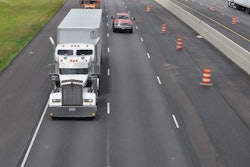Trucking news and briefs for Monday, April 19, 2021:
Congress again eyes liability insurance minimum increase
A bill that would tie truck owners’ minimum liability insurance requirements to medical care inflation has been reintroduced in the U.S. House.
Rep. Jesus “Chuy” Garcia (D-Illinois) first introduced the legislation, dubbed the “Improving National Safety by Updating the Required Amount of Insurance Needed by Commercial Motor Vehicles per Event (INSURANCE) Act” in 2019, but it never advanced past the House Transportation Committee.
[ALSO SEE: UAW union at Volvo truck plant goes on strike]
While the text of the reintroduced bill is not yet available, the original bill called for motor carriers’ minimum insurance levels to be raised from $750,000, based on medical-cost inflation.
According to the language of the 2019 bill, the amount of $750,000, which was set as the insurance minimum in 1980, would have had the same buying power as $4.9 million in 2019, based on medical-cost inflation.
The bill would also require the Department of Transportation to adjust the liability minimum every five years.
The American Trucking Associations said it believes any changes to the liability minimum should be made following stakeholder input and opposes arbitrary increases.
“ATA firmly believes that any changes to minimum insurance levels should be stakeholder driven and should ultimately reflect stakeholder input," said Sean McNally, ATA VP of Public Affairs. "ATA will advocate that any changes be undertaken through a negotiated rulemaking so that the perspectives of all stakeholders are taken into account, and so that any changes are genuinely responsive to highway safety needs. ATA opposes arbitrary increases to minimum insurance levels calculated to pad the pockets of the trial lawyers.”
The Owner-Operator Independent Drivers Association and other trucking groups have long been opposed to increasing the insurance minimum for motor carriers. More than 60 trucking-related organizations penned a letter in February to the House Committee on Transportation and Infrastructure to discourage any attempts to increase the minimum.
“Increasing the liability requirement will not make highways safer, is wholly unnecessary and would have a severe negative impact on small-business truckers, farmers and manufacturers,” OOIDA said in a statement Friday morning.
The Truck Safety Coalition and trial lawyer group American Association for Justice are among groups that have voiced support for Garcia’s INSURANCE Act.
[Related: Bills reintroduced to raise minimum liability limits, require automatic emergency braking]
Indiana-based fleet announces driver pay increase, new equipment
Gary, Indiana-based AFC Transport is rewarding its company drivers with new equipment and the company’s biggest pay increase in its history.
For flatbed drivers, the 160-truck fleet is raising pay from 55 cents per mile to 60 cents per mile. Pay for reefer drivers is increasing from 51 to 55 cents per mile. Drivers can also choose to be paid a percentage of the total gross pay for each load.
In addition to the pay increase, AFC has also purchased more than 60 new trucks, including new Peterbilt 579, 567 and 389 trucks equipped with Cummins engines, and new Reitnouer flatbed trailers.
Buchheit Logistics driver earns Driver of the Year honors in Missouri
Sid Naramore, an end dump driver for 130-truck carrier Buchheit Logistics, was named the 2020 Driver of the Year by the Missouri Trucking Association earlier this month.
Naramore has been a truck driver for nearly 40 years and has driven for Buchheit for more than 12 years. He has driver more than two million accident-free miles throughout his career.
The MoTA Driver of the Year award is presented to a driver who has been awarded a Driver of the Month award in the same year. Drivers are chosen for their outstanding performance and dedication to safety.












